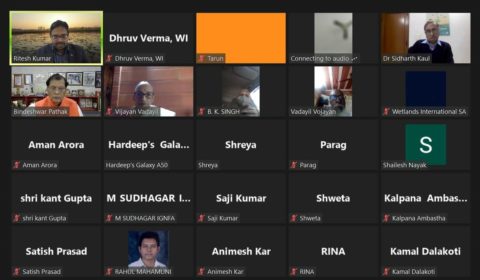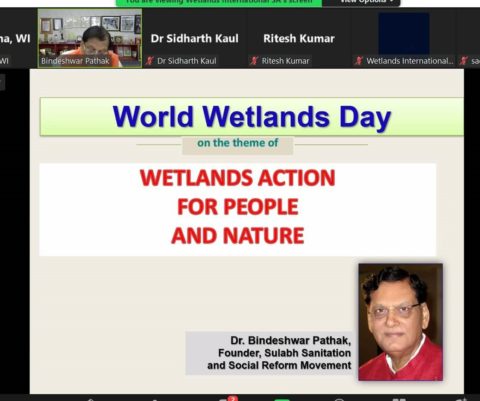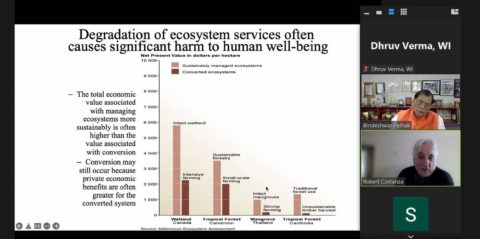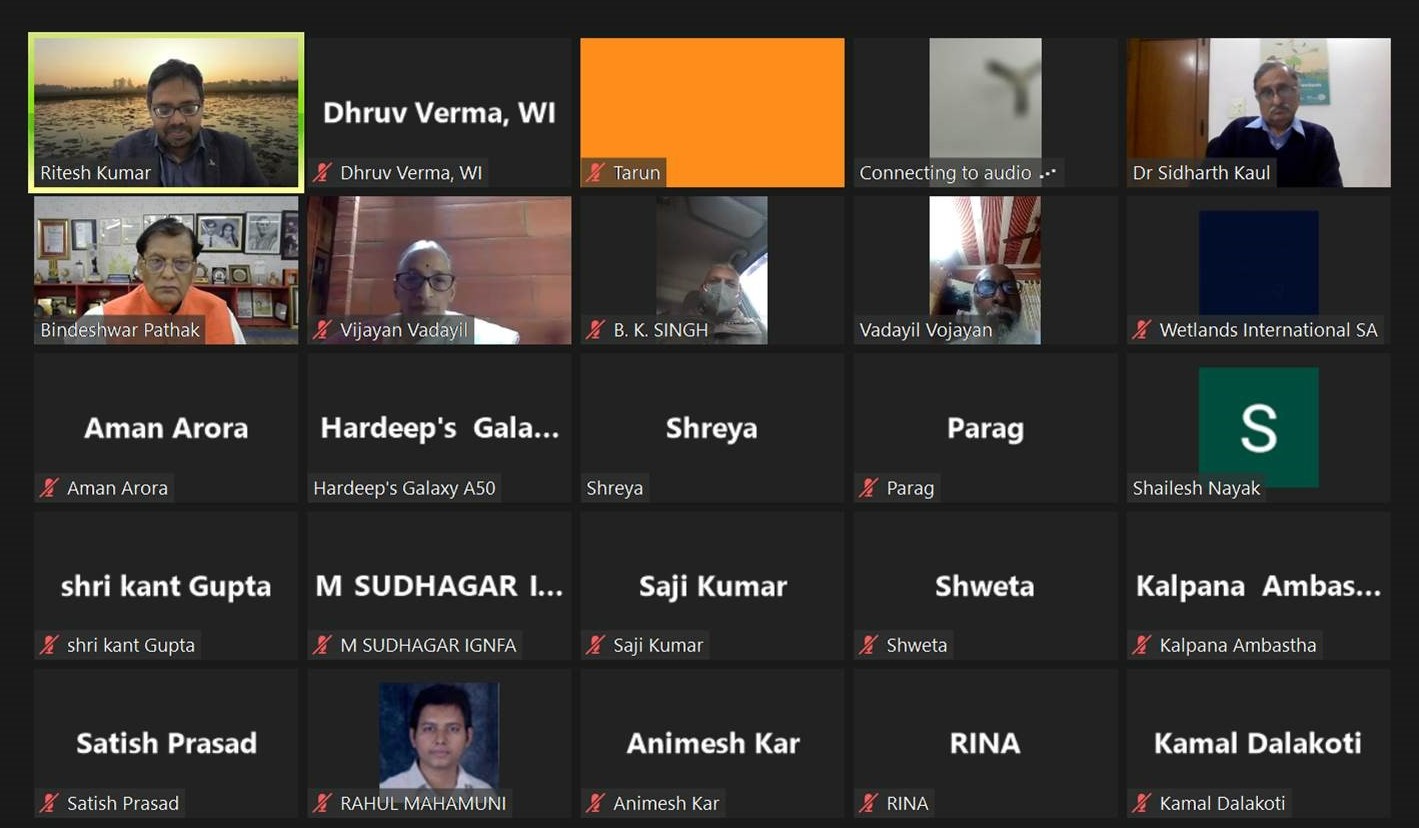
Social inclusion and behaviour change key to wetlands action for people and nature
-
Community resilience
New Delhi, February 02, 2022: Marking the first World Wetlands Day (WWD) since official recognition at the United Nations, Wetlands International South Asia celebrated the global event in the form of a public webinar on the theme ‘Wetlands Action for People and Nature’. The webinar was attended by over 120 participants from all across India and abroad and was also live-streamed.
World Wetlands Day is celebrated annually to commemorate the adoption of the Ramsar Convention on wetlands on February 2nd, 1971 in the Iranian city of Ramsar. 2022 marks the 50th year of adoption of the Convention.
Padma Bhushan Dr Bindeshwar Pathak, Founder, Sulabh International Social Service Organisation graced the occasion as the Chief Guest while Prof. Robert Costanza, Professor of Ecological Economics, Institute for Global Prosperity (IGP), University College London, delivered the special address. Dr Shailesh Nayak, Director, National Institute of Advanced Studies, Indian Institute of Science was the guest of honour. Dr Ritesh Kumar, Director, Wetlands International South Asia moderated the event.
Dr Sidharth Kaul (President, Wetlands International South Asia) delivered the inaugural address, presenting the background of the World Wetlands Day celebration, and the ways in which Wetlands International South Asia has been working for conservation and wise use of wetlands ecosystem since the last 25 years.
Dr Kaul brought to the fore the urgent need to restore the degraded wetlands through ecosystem restoration, by upscaling investment of financial, human and political capital to the cause. To do this action, he recommended action in three major areas. Firstly, the full range of benefits that wetlands provide naturally needs to be valued as a nature-based solution for societal challenges such as meeting the food, water and climate security. Secondly, wetlands need to be managed sustainably so that their health is maintained at present as well as into the future. Thirdly, degraded wetlands need to be restored through best-possible science and stakeholder participation. Dr Kaul also mentioned that the organization’s work is designed around three priorities: improving wetlands science and practice; developing the capacity of wetlands managers and stakeholders to effectively manage wetlands, and building partnerships to bring diverse stakeholders and sectors on board for wetlands conservation and wise use.
Wetlands International South Asia’s newsletter Sarovar (on the theme Wetlands and Water) and World Wetlands Day Poster were released.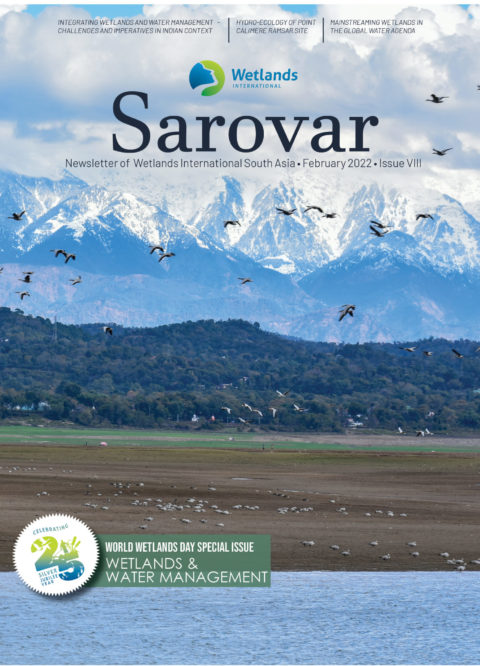
The Chief Guest, Padma Bhushan Dr Bindeshwar Pathak, Founder, Sulabh International Social Service Organisation, shared his 40 years journey in building ecological sanitation solutions, and in the later part of his life, on social empowerment of widows. Different initiatives under his guidance were appreciated within and beyond the country’s boundary and had been adopted by stakeholders and communities. Setting examples and inspiring through his work at the community level, Dr Pathak emphasized that the wetlands loss cannot be stemmed without bringing individuals and society on board, through a dedicated social mobilization process.
Prof Robert Costanza, Professor of Ecological Economics, Institute for Global Prosperity (IGP), University College London delivered a social address on wetlands values for integration in developmental planning. As the Anthropocene is pushing several ecosystems towards a tipping point, Prof Costanza highlighted the need to bring on board ecosystem service values to support informed decision-making at various levels. The time is now to build an economy and society based on the goal of sustainable well-being of humans and the rest of the world. For the Sustainable and Desirable Future, he highlighted 3 points – Vision (How the world is, how we would like it to be), Tools & Analysis (System thinking and modelling), and Implementation (including crafting new institutions aligned with character of ecosystem services provision). Through several examples, Prof Costanza stressed the conventional economic estimates insufficiently captured ecosystem services and natural capital inter-dependencies, and thereby did not give the right cues to the market for internalizing environmental stresses.
Dr Shailesh Nayak, Director National Institute of Advanced Studies Indian Institute of Science, mentioned the increasing vulnerability of coastal wetlands to climate change. Outlining the implications of various climate change projections on wetlands, he indicated that the current knowledge of several key ecosystem processes acting in coastal and near-shore marine ecosystems is very limited, and thereby there is a pertinent need for setting robust monitoring systems for the same. Some species of corals have been observed to have recuperated from intensive bleaching episodes, which needs to be carefully studied to develop effective restoration strategies.
At close, the webinar speakers and discussants stressed that Wetlands International South Asia should pursue science-based and inclusive wetlands restoration initiatives, with a focus on bringing about affirmative behavior change in favor of wetlands wise use.
About Wetlands International South Asia
Wetlands International South Asia is a non-government organization that works for restoring and sustaining wetlands, their resources, and biodiversity in the South Asia region. The organization provides evidence-based scientific and technical advice to central and state governments, wetland authorities, and civil society on various aspects of wetland management. The Wetlands International South Asia office in New Delhi (India) was established in 1996 as part of the Wetlands International network. During 25 years of work in India, the organizsation has formulated integrated plans for holistic management of several wetlands, conducted training courses for capacity development of wetland managers, undertaken inventory and assessments of wetland biodiversity and ecosystem services, and worked for enhancing awareness of wetland values in society at large. A General Body comprising eminent conservation planners and experts steer the strategic directions of the organisation. Further information on our work is at: south-asia.wetlands.org
Contact
Media queries
Dr Sidharth Kaul, President (Mob: 9818 329 366, Email: [email protected])
Dr Ritesh Kumar, Director (Mob: 9711 544 957, Email: [email protected])

